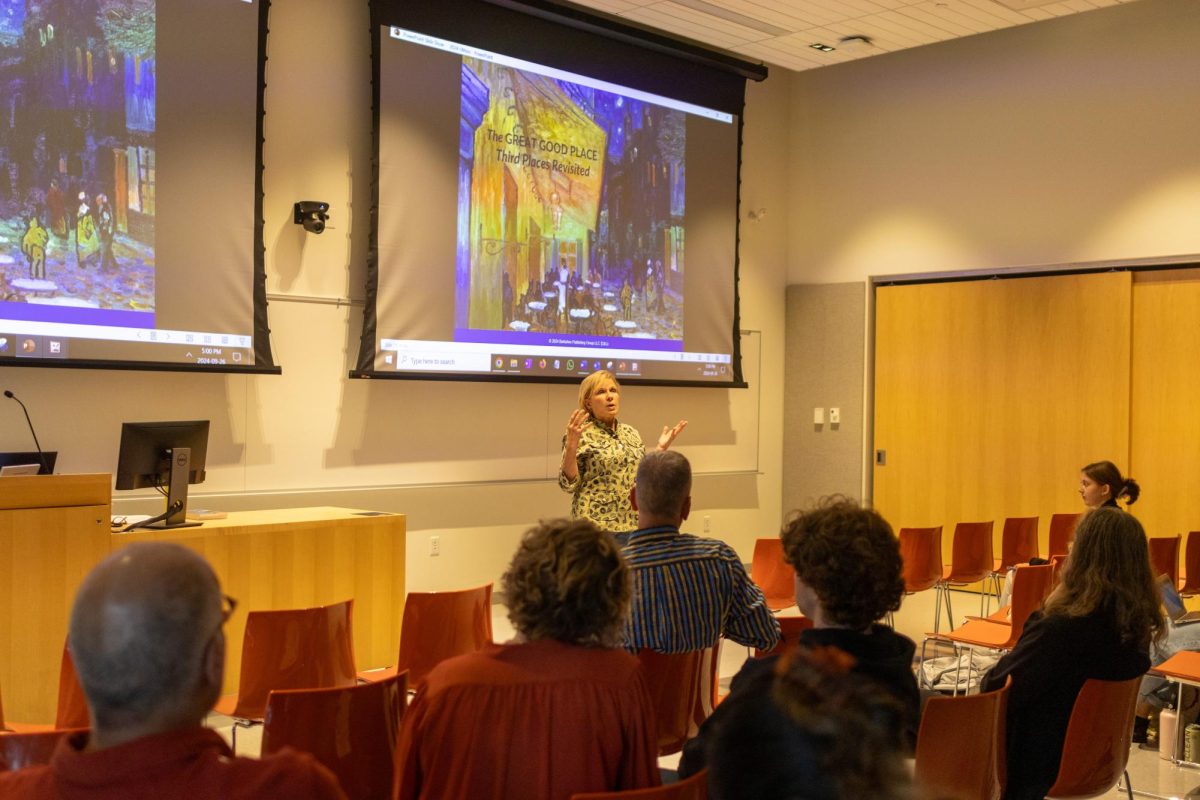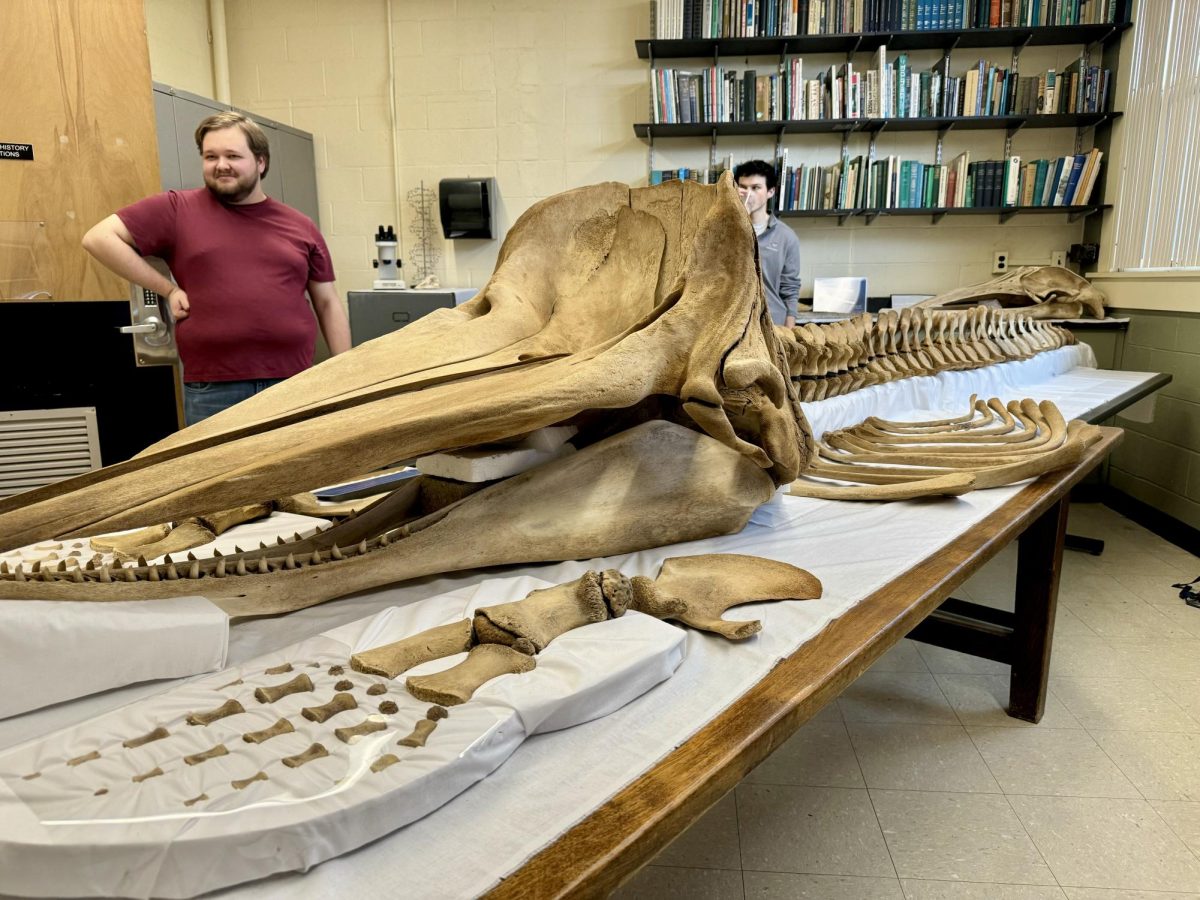
The Humane League’s Director of Campus Outreach Rachel Atcheson visited the University of Massachusetts Tuesday evening to speak to students about industrial agriculture and its effects on both animals and humans.
The talk, which was held in Chenoweth Laboratory Room 113 at 7 p.m., was attended by about 20 students. Many of the attendees were members of PNUT (short for plant-based nutrition), a registered student organization that seeks to educate the UMass community about veganism and vegetarianism, helped coordinate the lecture.
In her position, Atcheson oversees 30 college students who act as campus coordinators for the Humane League at different universities across the United States, and helps them to advocate for a vegetarian lifestyle at their respective colleges.
Speaking to students on Tuesday, Atcheson explained why her organization considers vegetarian and vegan lifestyles to be so crucial: to prevent animal cruelty on factory farms.
The reality behind today’s farming, she explained, is “not what we think of when we think of a classic American farm.”
Atcheson claimed that since the 1960s, the number of animals per farm in the U.S. has increased, with the number of farms decreasing. Using chickens as an example, she explained that today, 500,000 hens is a standard number to have on a factory farm, which “houses a lot of animals in roughly seven to 10 square city blocks of space.”
Under such conditions, “each hen will be given less space than the average sheet of paper to spend their lives on,” with cages stacked one on top of the other, Atcheson said.
To further aggravate the issue, she continued, the birds “are bred to grow so large, so fast that their legs can barely sustain their weight.” Should an animal sustain an injury, there is no individual vet attention.
To supplement her points, Atcheson showed the group an eight-minute clip documenting the atrocities carried out on factory farms not just against chickens, but cows and pigs as well. The severely graphic video footage was filmed during undercover investigations, and showed male chicks being ground alive and young pigs being slammed against concrete, among other things.
In addition to the inhumane practices, Atcheson explained that factory farming is also problematic because of its effects on the environment.
With nine billion land animals raised and killed for food in the U.S. each year, the waste is substantial and often becomes run-off in our waterways. The waste also typically contains antibiotics and growth hormones, which are harmful to humans if they are overly exposed.
Providing water for nine billion animals and watering the crops that in turn feed the animals puts a significant strain on the earth’s water supply, Atcheson added, claiming that enough water from six months of showers is needed in order to produce one pound of hamburger.
While Atcheson herself is a vegan, she recommended that all people at least decrease their meat consumption in order to cut down on the number of animals that are pushed through factory farms.
“If you were to decrease your chicken consumption by half, you’d save 14 chickens per year,” she said. Considering animal products can increase the risk of heart disease, certain cancers, stroke, Type 2 diabetes, obesity, hypertension and high cholesterol, Atcheson said, cutting down on meat could improve human health as well.
A common argument that Atcheson said she comes across is that people need animal products in order to gain protein, calcium and iron. To this, Atcheson was quick to bring up PowerPoint slides featuring foods containing these nutrients. For example, seeds, beans and lentils can provide necessary protein.
Although Atcheson is optimistic that factory farming will be eliminated, possibly within 50 years, she said that discussion of the issue is crucial to inciting change.
“It’s not that people are O.K. with factory farming, it’s that they don’t know what factory farming actually is,” added Laura Hancock, UMass’ campus coordinator with the Humane League, who worked with PNUT to organize Atcheson’s talk.
Together, Hancock and Atcheson have arranged leafletting, pay-per-view events (where students are given a dollar to watch a four-minute video about factory farming), movie screenings and guest speakers to raise awareness of the inhumane practices on factory farms.
“At the end of the day, it’s not for you,” Atcheson said. “I leaflet because I know factory farming has an end date, and if I can get that date a little closer to now, I’ve accomplished what I set out to do.”
Shelby Ashline can be reached at [email protected] and followed on Twitter @Shelby_Ashline.



















Tolf • Feb 17, 2016 at 2:54 am
This is good news. We never had this kind action on my campus, but I’m thankful that students are exposed to this information and that these networks exist.